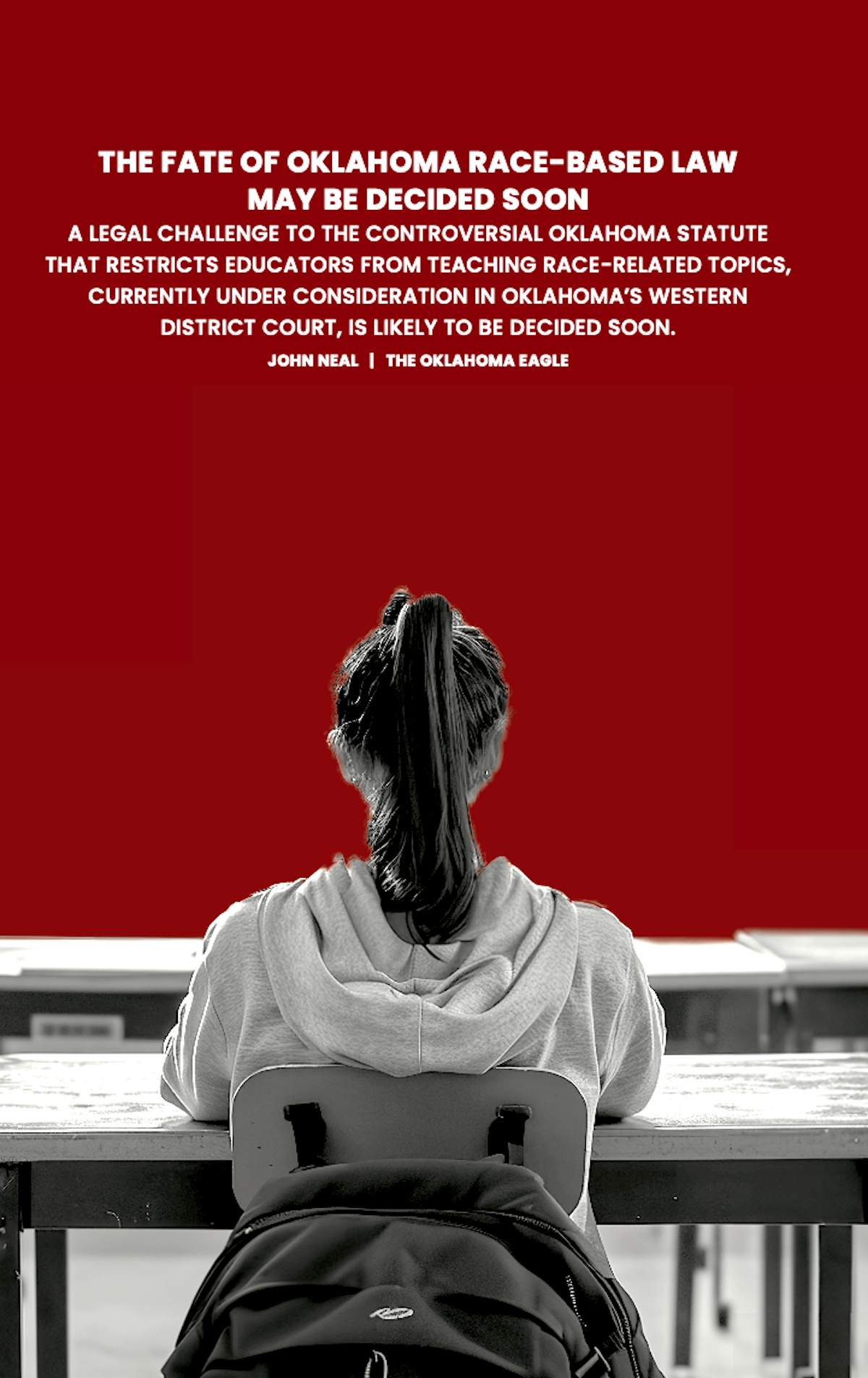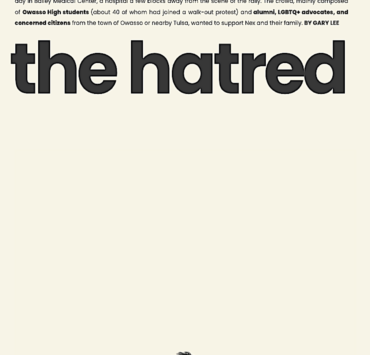
LOCAL & STATE
‘UNQUALIFIED’ JUDGE TO Make Ruling
John Neal
Illustration. The Oklahoma Eagle
A legal challenge to the controversial Oklahoma statute that restricts educators from teaching race-related topics, currently under consideration in Oklahoma’s Western District Court, is likely to be decided soon. The law, HB 1775, pushed through by conservative state lawmakers in 2021, has hampered teachers across the state from educating students about such issues as the 1921 Tulsa Race Massacre that affected African Americans who were attacked and many were killed by a white mob in Tulsa or forced removal of Native Americans from the South to Indian Territory in the early 1800s.
The American Civil Liberties Union (ACLU), the nationally renowned nonprofit advocating civil rights, is the lead organization marshaling the case through the legal system. The ACLU made oral arguments in the District Court in December 2023 before District Judge Charles Goodwin. Oral presentations are often the last step in a case before a judicial ruling. Emerson Sykes, the lead ACLU attorney in the suit, argued that HB 1775 is “unconstitutionally vague, overbroad and viewpoint discriminatory.” The statute, Sykes added, “restricts teaching about racism and sexism in Oklahoma’s colleges, universities and public schools.”
Sykes encouraged the court to issue a preliminary injunction blocking the law. The plaintiffs in the case, including an Oklahoma City high school teacher, expressed hope that the case will lead to the dismissal of the statute and end the cloud of censorship it has brought over classrooms across Oklahoma.

Anthony Crawford, Oklahoma City, Okla. high school teacher and plantiff noted in Black Emergency Response Team, et al., vs. Gentner Drummond. Photo Provided
The fervent statements of the schoolteacher, Anthony Crawford, and the eloquent presentation by Sykes, made their battle against HB 1775 even more powerful. Both are African American human rights advocates. Their views of the Oklahoma statute are that it is misguided and harmful.
And yet, District Judge Charles Goodwin, who will decide the case, has been found “unqualified” by the American Bar Association. The ABA, the leading national organization for legal professionals, initially found Goodwin unqualified for the bench in 2017. Goodwin, appointed to District Court in 2018 by then Pres. Donald J. Trump, has delayed court proceeding in the ACLU’s case for over two years. He is the first nominee to a federal District Court in over a decade that the ABA has deemed “not qualified.”
HB 1775 places the accreditation of school districts at risk if they violate any of eight different race related concepts in teaching or training. The Oklahoma State Board of Education (OSBE) used the statute to sanction Tulsa Public Schools (TPS) in July 2022. That sanctioning was the first in a series of actions that the board has brought against TPS. The OSBE, under the helm of Oklahoma Superintendent of Public Instruction Ryan Walters, continues to threaten to take control of Tulsa’s school district board.
Contested law
The ACLU first brought Oklahoma students, teachers, professors, and others together to forge the case against HB 1775 in 2021 in the U.S. Court for the Western District of Oklahoma. The case was brought on behalf of Black Emergency Response Team, the American Civil Liberties Union, ACLU Oklahoma, and the Lawyers Committee for Civil Rights. It is officially the Black Emergency Response Team, et al., vs. Gentner Drummond in his official capacity as Oklahoma attorney general, et al.
ACLU attorney Sykes said early in his oral arguments, that “…teachers, many of whom are here with us in the courtroom, can’t understand what content can be taught and what can’t, and they risk losing their livelihoods if they get it wrong.” HB 1775 provides for potential revocation of a teacher’s license.
One of the teachers in the courtroom was Crawford, an Oklahoma City high school teacher. In an exclusive interview, Crawford told The Oklahoma Eagle that although he “only provides information in the classroom,” he was scared when HB 1775 became law. “I’m going to get fired” was among his first thoughts, the teacher said. “They took down some of my books and changed my lesson plans.” Nevertheless, Crawford feared a teaching complaint, although he labored to “not show bias,” he told The Oklahoma Eagle.
Complaint-based HB 1775 affected TPS in 2021 when a white teacher at Memorial High School griped that an outsourced training course on implicit bias “shame white people for past offenses in history.”
The Oklahoma Eagle uncovered the basis for the Tulsa complaint filed with the OSDE via an Open Records Request by the newspaper. The law enacted in May 2021 includes a prohibition against eight concepts in mandatory training “or make part of a course.” The law has had a chilling effect on training and classroom instruction, as no other HB 1775 complaint has resulted in a downgrading of a district’s accreditation since 2022.
One concept of the eight that are banned in HB 1775 centers on the prohibition on training or teaching those causes “any individual should feel discomfort, guilt, anguish, or any form of psychological distress on account of his race or sex…” Based on the complaint, the OSBE, in a controversial decision, downgraded Tulsa Public Schools to “Accreditation with Warning” at its July 28, 2022, meeting.
Then TPS District Superintendent Deborah Gist called the board action “egregious and baseless.” At the TPS meeting on August 2022, the board, in a 3-2 vote, denied TPS’s request to reconsider the accreditation downgrading. Megan Lambert, legal director of Oklahoma’s ACLU, told The Oklahoma Eagle in an interview in August 2022 that the action against TPS was” extremely troubling.” However, Lambert added the accreditation sanction imposed on TPS would bolster its case against the racially discriminatory law.
Oral arguments
In the oral arguments, ACLU attorney Sykes reminded the court that the Oklahoma law’s “eight divisive concepts was directly cut and pasted from former Pres. Donald Trump’s Executive Order 13950, which before we even filed, was enjoined on the grounds of vagueness.”
Sykes also argued the law violates the Equal Protection Clause of the 14th Amendment to the U.S. Constitution. He noted for the Court the “legislature’s inflammatory radicalized statements while the law was being considered, and the disparate impact the law is having on Black and Indigenous students whose stories are being erased from the curriculum.”
OKC teacher Crawford said this legislative finger-pointing was hypocritical. In an interview with The Oklahoma Eagle, Crawford said that “the judicial system is biased; the educational system is biased. All we are doing is presenting the bias to our students. Students need to know who they are and where they are coming from.”
Sykes, the ACLU attorney, also pointed to legislative hypocrisy, arguing antidiscrimination, as claimed by defense counsel, “is not their real intent here.” “What this law does is something quite different and unique. It picks specific ideas that are politically incorrect, according to Oklahoma legislature, and prohibits the mere discussion of these ideas in public schools…”
Crawford’s practical experience in the classroom paralleled Sykes’ views expressed in the courtroom. Sykes said, “By the plain letter of the law,” Sykes said, “teachers should somehow teach that African-Americans should not feel discomfort learning about slavery, that Jewish students should not feel discomfort learning about the Holocaust, that American Indian students should not feel discomfort when learning about the Trail of Tears.”
Judge Goodwin ‘unqualified’
Oklahoma ACLU’s Lambert told The Oklahoma Eagle, “In September (2023), the plaintiffs made a motion to get this case moving because it had been pending for almost two years.” This implied criticism of Judge Charles Goodwin is not new. Criticism of his work habits, including “frequent absence from the courthouse,” was noted in a letter to the Senate Judiciary Committee in 2017, when the panel was considering Goodwin’s nomination to the federal bench.
Ultimately, the 15-member American Bar Association Standing Committee on the Federal Judiciary gave Charles Barnes Goodwin a “not qualified” rating on his nomination from a magistrate judge to the federal judiciary. The ABA JOURNAL reported this decision in its October 30, 2017, article. In 2018, the Senate approved Goodwin as U.S. District Judge for the Western District of Oklahoma.
Nevertheless, Lambert told The Oklahoma Eagle, “The Court told us to expect the order soon so we can make a decision on our motion for a preliminary injunction any day now.” However, Judge Goodwin made clear in December’s court proceedings he had several alternatives, including passing the case to the Oklahoma Supreme Court.
Crawford, the Oklahoma City teacher, expressed optimism about the Court’s pending decision.
“It’s unfair for us not to tell the truth about what happened,” he told The Oklahoma Eagle. “They burned down things we began in this country. Tulsa was not the only place where (B)lack towns were burned down. Many (B)lack towns were burned down because of the economic power we developed. This is a major part of American History.”










